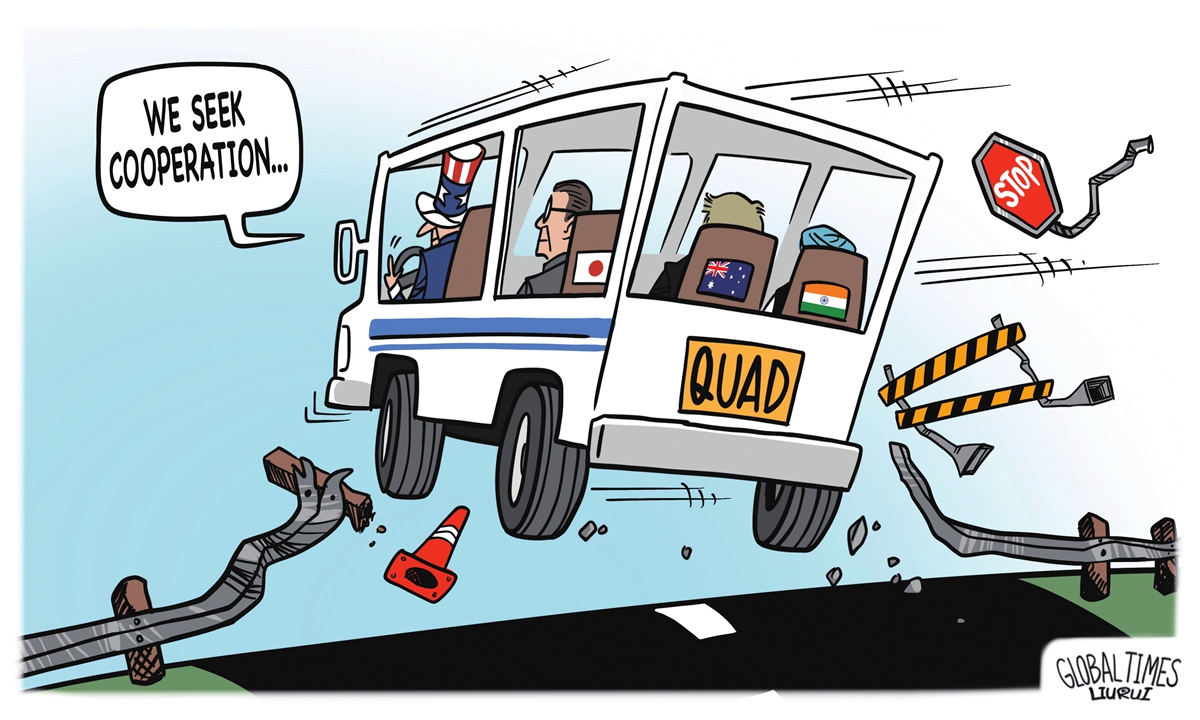
Quad Photo: Liu Rui/GT
An upgraded military agreement expected to be signed between Australia and Japan to share intelligence assessments on China is seen by experts as a coordinated move under the US to militarily intimidate China and pave the way for Japan's joining of the Five Eyes Alliance. However, they warned that closer cooperation between two US allies will only make them stepping stones for the US, as making any military deployment in such a strategically sensitive area will bring a counterattack on the front line, while the US reaps the profits across the Pacific.
Japanese Prime Minister Fumio Kishida is set to visit Perth from Friday to Sunday and meet counterpart Anthony Albanese. On Wednesday, Japan's ambassador to Australia, Shingo Yamagami said in an interview with Guardian Australia that a new security declaration will be signed by the two leaders, updating a previous deal from 15 years ago. The ambassador said the deal would include "steps to strengthen the exchange of strategic assessments" between the two countries.
Yamagami said Japan's expertise and insights on China's intentions were "sought after by our Five Eyes partners," including Australia.
Chinese observers see this new deal in the making as a sequel to a treaty signed by the two countries in January that allows military forces from both countries to train at each other's bases and to collaborate on humanitarian missions.
The January treaty is Japan's second such agreement. Its first such military pact is with the US, a status of force agreement that dates back to 1960.
It is clear that this is Japan's move to highlight its status under the Quad framework, which also has the US, Australia and India as members; and seek diplomatic, as well as military breakthroughs through this framework, as the Japanese government is looking to beef up its military budget as a result of its rising militarism, Da Zhigang, director of the Institute of Northeast Asian Studies at Heilongjiang Provincial Academy of Social Sciences, told the Global Times.
Moreover, by establishing an information-sharing mechanism with Australia, Japan will also acquire access to the Five Eyes Alliance, an intelligence alliance comprising Australia, Canada, New Zealand, UK and the US.
Japan has repeatedly voiced its intention of joining the alliance. In 2020, the then Japanese defense minister, Taro Kono, proposed Japanese membership in a revamped "Six Eyes" partnership. Last year, Yamagami said that he "would like to see this idea become reality in the near future."
Military experts warned that warming military ties may not be as good for Japan and Australia as it seems.
Da said that the scope of their military cooperation is wide, and includes the West Pacific and some parts of the Indian Ocean. "Both Japan and Australia are trying to hype the China threat and attempting to pull in extra-territorial countries to their small clique. But this puts regional countries on the alert and threatens regional stability," said Da.
When Australia, the UK and the US announced the forming of AUKUS, the trilateral security partnership, in September 2021, many Southeast Asian countries were alarmed. Indonesia and Malaysia immediately warned of an "arms race" being triggered by the announcement.
Closer military ties between Australia and Japan are also something that the US wants, thus Japan's self-defense forces can walk out of West Pacific while Australian military forces can be brought into the West Pacific, South China Sea and even East China Sea to conduct coordinated operations with the US and Japan, Wei Dongxu, a Beijing-based military expert, told the Global Times.
He warned that the intelligence sharing between Canberra and Tokyo, which includes mutual sharing and analysis of military information, and coordinated military moves against China, will only benefit the US. "Washington has pushed its allies' military forces to the front area, a sensitive area, and also pushed them into a frontal attack, while it sits idly across the Pacific to enjoy the rewards of their efforts."




